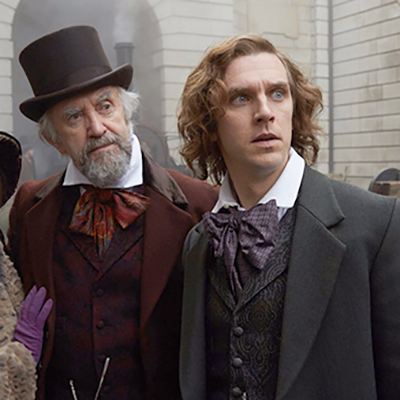

Is There Someone You Need to Forgive This Christmas?
Is There Someone You Need to Forgive This Christmas?

Justice and Mercy in The Man Who Invented Christmas
A dear friend of mine once shared with me a deep pain in his heart when I asked about his father. His parents divorced when he and his siblings were very young, and in the bitterness and anger at the father that followed, only my friend continued to see his father on a regular basis.
In recent years, his father has been seriously ill and living in an assisted care facility. Holiday gatherings consist of the children and their families gathering at the mother’s house with their stepfather, while my friend and his wife make an extra visit to the father to hold a simple celebration and to pray. Many years ago, the father came back to his Catholic faith, which eventually led to this son also embracing Catholicism.
My friend’s siblings have rarely spoken to the father since their youth and seem to carry an anger that serves as a punishment for past misdeeds and wounds caused from the reckless life their father lived as a young man. The pain of his mother and siblings is very real and understandable. We’ve often wondered if his father is hanging on with hope of a reconciliation.
Where my friend differs from his siblings is in his willingness to show mercy to his father. The Latin word for mercy is misericordia, which means “a heart which gives itself to those in misery.”
The human heart, of course, yearns for justice. God put that yearning in our hearts. However, as Saint John Paul II once challenged us in Dives in Misericordia (paraphrasing), Is it just just to be just? Or does justice to the human heart also demand mercy?
This was the dilemma at the heart of one of the better holiday movies I’ve seen in some time: The Man Who Invented Christmas (2017). The charming, funny and inspiring story centers on author Charles Dickens and the origin of his classic novel A Christmas Carol. Of course, we know Dickens did not invent Christmas… the title refers to how A Christmas Carol popularized many of the traditions we celebrate as part of Christmas (among them the decorated tree, turkey dinner, lights, presents and charitable giving).
[SPOILERS AHEAD] At the heart of this film’s story is a battle inside Dickens. He struggles mightily with the character of Scrooge and the story’s ending. In Scrooge, Dickens buries all of his anger, bitterness and cynicism over injustice in the world, particularly those whose idol is wealth. Dickens wants Scrooge to face justice for his selfish and God-less ways. When pitching the book to his publisher, he gives an early title that hardly inspires Christmas cheer: “Humbug! A Miser’s Lament.”
But from where did all of that angst toward Scrooge first spring? Dickens’ soul-searching takes him back, like so many men, to his relationship with his father.
While the film mixes fact and fiction, we do know that Dickens’ father loved his family but was so reckless financially that, at an early age, Dickens’ innocence was shattered by being sent to a workhouse while his father, mother and siblings were taken to a debtor’s prison. In the film, his father continues his recklessness in his later years, blurring his devotion to his grandchildren with trying to earn fast bucks off his son’s fame even though Charles, in his success, bought his parents a country home and hired help, and gave a generous stipend to retire in comfort.
Charles loses hope that his father will change, and tensions boil to a painful scene where he sees no other option than to sever ties forever. Like Scrooge, Charles cannot see how such a broken, manipulative soul can ever be redeemed. He seeks justice without mercy. Add the pressure of his rapidly approaching publishing deadline and a lack of an ending to the story, and Charles finds himself in a very dark and nearly hopeless place.
Assuming most of you have read A Christmas Carol, you know how the book’s ultimate dilemma is resolved. For those who don’t, Scrooge comes face to face with his sins and his heart cracks open just enough to receive a ray of mercy, changing his life forever. Charles’ running from his past brings him full circle to the place of his greatest fear and pain — the now-dilapidated, ghostly workhouse. He rips the scab off the father wound on his heart and allows — under crippling self doubt and despair — a ray of mercy to soak in, which then inspires the ending.
When it was released on Dec. 19, 1843, A Christmas Carol achieved instant success and sold out its initial run by Christmas Eve. The book was a smash hit (and continues to be) because it tapped into the ache in the reader’s heart for authentic love … knowing that, despite there being a little (or a lot) of Scrooge in us, there is Someone who still loves us and allows us to wake up the next morning deciding to be a better person. All of us deep down crave redemption in ourselves and others, not out of weakness, but because God created us to be redeemed through his love and mercy.
As you embark on Christmas and New Year’s gatherings of family and friends, if anyone there has wounded you, pray for the grace to be a vessel of mercy. When we live out justice with mercy, healing takes place and estranged family members and friends can finally embrace and pray in gratitude and humility, “God bless us, everyone.”
(Bill Howard is media director for Theology of the Body Institute. Prior to joining The Cor Project, he was an award-winning editor for nearly two decades in the Catholic press. This article first appeared dec. 21, 2017, at CorProject.com.)
Image from “The Man Who Invented Christmas”/Bleecker Street.


